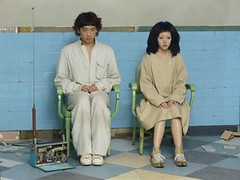
There have been many films about Mental Health, but not many that really understands the subject. Films that don’t get the subject right tend to add to the misunderstanding about mental health and also to the stigma surrounding it.
‘I’m a Cyborg, but that’s OK’ (2006) gets it right, ‘Schizo’ (1976) gets it wrong. ‘I’m a Cyborg, but that’s ok’ is a South Korean comedy romance that sensitively and fantastically portrays the characters. It is well directed by Park Chan-wook and well acted and approaches the subject of mental illness in a very open manner. Whereas ‘Schizo’ directed by Pete Walker is a slasher film that after it’s release had to carry a disclaimer saying that it did not portray mental illness properly. It promoted the notion that people with Schizophrenia had a split personality, one of which was always dangerous.
Hitchcock’s Psycho (1960), whilst titilating the senses of cinema audiences, once again portrayed the main protagonist Norman Bates as a quiet, rather introverted character with a dark secret and even darker nature.
‘You can’t trust ’em?’
‘Madness means dangerous!’
This is the trouble with making movies about mental health, Hitchcock and Walker set out to entertain and not to educate people, why should they? However the films played to audiences that on the didn’t understand ‘mental health’, don’t get me wrong, people go to see films because they enoy films, they talk about the film with their friends and it stops there. For a small number the film becomes their education, the film generated impression becomes their compass when coming into contact with people who are ‘mentally ill’, the stigma has been primed.
Darren Aronofsky’s ‘Black Swan’ (2010), portrayed the main chararcter Nina Sayers in a more humane and understanding way, mapping her descent into madness and the drivers behind that descent.
I am a film lover and have been since being very young, film has always fascinated me, I would never want films to be anything but a visual narrative, whether horror, drama, science fiction / fantasy, comedy or whatever. The telling of a story and should certainly not censored by having to be, in the case of mental health ‘psychologically or otherwise correct’, this would lead to a subversion of freedom of expression.
People can and do get their information from other sources too (though many of the headlines in the media tend to be negative and intent on being over-dramatic). The problem is, as I have already said, is that generally people are uniformed about mental health and will take in dramatic representation as truth. How we educate people has got to start with how we who work in health and social care, breakdown the misinformation as we come into contact with individuals and quietly challenge their understanding, provide the correct information, be role models in how we work with people with mental health problems and promote inclusion and destigmatisation.
What am I saying in this Blog? I’m saying it’s not in the hands of the film makers to educate society, were they do great, more power to them, were they don’t enjoy the film. It is in our hands to educate and support those with mental health problems.
Happy educating.